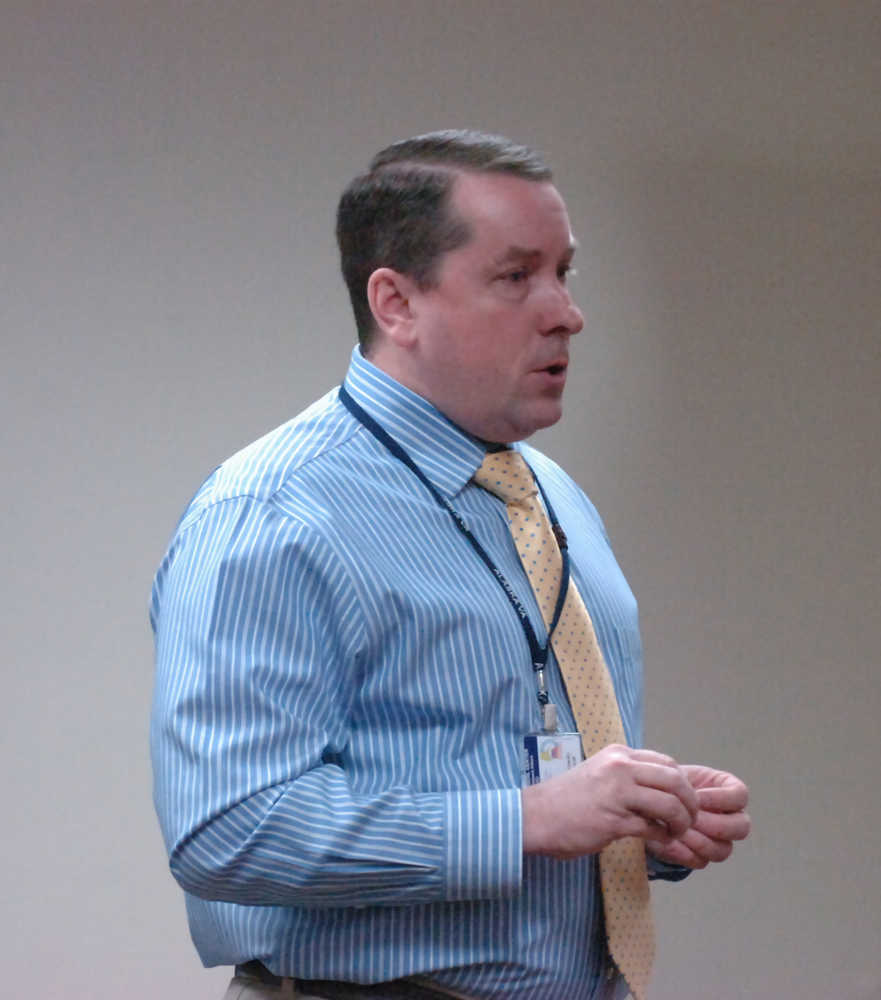The Department of Veterans Affairs in Alaska is working on the second phase of a plan to fix bugs with the program set up by the Veterans Access, Choice, and Accountability Act, but local veterans say nothing has changed.
About 20 area veterans gathered in the McLane Commons at Kenai Peninsula College Friday night to hear from the Alaska VA’s associate director, Shawn Bransky, about where the department is at in terms of correcting issues with the bill, nicknamed the Choice Act. It was implemented in the state in 2014. Since then, veterans have cited difficulties scheduling appointments, while health care providers have said that they are not getting reimbursed.
Bransky said the VA has implemented the first of two phases in a plan to rectify these issues by creating a remote presence by staff from TriWest Healthcare Alliance, an Arizona-based provider tasked with delivering Choice Program services, in Alaska VA facilities. The second phase, in which new TriWest staff will have a physical presence in Alaska communities, didn’t happen on time, Bransky said.
One issue the VA has addressed was that TriWest call centers were “scattered” across the Lower 48, which meant that Alaska veterans could be getting calls from people who didn’t understand some of their geography-specific limitations. Bransky said those call centers have been consolidated.
There is now one call center dedicated to only handling Alaska calls and schedules.
Another change implemented since the VA started gathering veteran complains in a series of listening sessions this fall is that TriWest will take over scheduling appointments.
“Now you as a veteran, if you have a consult, don’t have to call the Choice (phone) number anymore,” he said. “TriWest will actually call you as the veteran when they get your consult.”
Veterans at Friday’s session said this still does not make getting an appointment easier, since TriWest still needs to confirm the appointments with the health care providers. Communication between those entities doesn’t seem to be happening, veterans said.
Bransky said he has gotten feedback that once TriWest gets a veteran’s appointment times they don’t always work for a specific vendor, which results in multiple calls back to the veteran, sometimes from different staff members.
“The back and forth is taking time and that’s not a good process,” Bransky said. “The better solution of what we have had the conversation today with TriWest, is to do a three-way call between a veteran and a place of care to facilitate that.”
Another veteran expressed confusion over how to opt in or out of the Choice Program itself. Alan Mathewson is a commercial fisherman from Kenai who served in the U.S. Marine Corps. He said during the session that he was never notified about the switch to the Choice Program, and was told he had opted out of it the next time he tried to set up a medical appointment. The only notice Mathewson said he was given was a phone call over the summer about a town hall meeting to discuss the program, but he was unable to attend because of his fishing business. When his appointment was canceled recently because it couldn’t be authorized, Mathewson said he was given several phone numbers to call, and that no one he talked to could rectify the situation.
“They all had the same answer: ‘You opted out of the program,’” he said. “How could I have opted out of a program that I’d never heard of?”
Mathewson said he was told that once a veteran opts out of the Choice Program, he or she can’t opt back in.
Bransky said he would connect Mathewson and other veterans who cited program issues with other VA staff that attended the session in order to try to resolve them.
The seven new staff members needed to complete the second phase of the VA’s plan to address Choice issues should be hired in January, Bransky said. They were originally supposed to be hired by November, he said.
“Part of the seven people that we had looked at putting here was taking back the appointing process for the consult management,” Bransky said. “At that particular point in time we actually did not have any awareness that the contract change was going to come into play where now TriWest does the calling of the appointments, so we had to do a little bit of an adjustment on that piece.”
The seven new hires will be tasked with addressing problems with scheduling and other bugs in the Choice Program, Bransky said. One will potentially be stationed permanently in Fairbanks, and one could be permanently stationed on the Kenai Peninsula, Bransky said.
Reach Megan Pacer at megan.pacer@peninsula.com.

